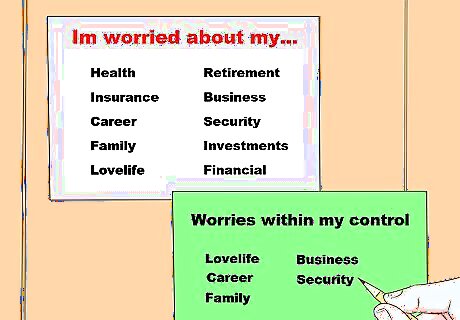
views
Taking Action Against Worries

Decide which worries are within your control. Write down everything you're worried about. Then, review the list and pull out all those that you can actually control. Rewrite them onto a separate list. The worries that are outside your control— save those for later.

Make a step-by-step plan to deal with actionable worries. Take the worries that are within your control and make a plan to address each one. For instance, if you are worried about your marriage falling apart, consider rekindling the romance or attending couples therapy. List out, step-by-step, actionable ways you can deal with or address the particular worry. For instance, your debt is an actionable worry, so write out some realistic steps for attacking it. These might include putting all your extra money towards the smallest debt each month, getting a part-time job, or cutting back on luxuries.

Do one thing everyday to move you closer to your ideal future. In order to stop the worries, you'll need to take daily action. Look at your list of steps and incorporate new habits into your daily routine. For example, if you want to rekindle the romance in your marriage, you might plan to have an hour of unplugged quality time with your partner each evening. Taking baby steps helps you build stronger habits over time rather than trying to do it all at once.

Remember other times when you've overcome obstacles. Worry can seem debilitating and make you forget your true capabilities. Boost your confidence and resilience by calling to mind other similar situations that you have successfully gotten through. For instance, if you and your spouse nearly split years ago, you might draw on that memory (and the fact that you withstood the forces against you) to help you overcome the present-day roadblocks.

Examine your progress every month. At the end of each month, look back over your progress and see how far you've come. Go through each goal you've set and see whether you are on track to completing it. In some cases, you may have surpassed your goal. In others, you might need to go back to the drawing board and figure out a new plan. Do this monthly to make sure you stay on course.
Addressing Worries Beyond Your Control

Look for evidence supporting the outcome you fear. Take the worries you've identified as being out of your control and go through each one. Ask yourself what evidence there is to support this worry coming to pass. Worrying is often the result of us abusing our imagination. For instance, if you worry about getting fired from your job, question the evidence that supports your concern. Have you gotten several write-ups? Are you a liability to your employer? Has your employer threatened to fire you? If you answered “no" to those questions, then there's no evidence to support this worry.

Entertain the worst-case scenario. You can empower yourself to cope with worries that are out of your control by thinking through how you would respond if they happened. Thinking about the worst-case can help you see that what you're worried about isn't as bad as it seems. Spend just a few minutes thinking through a few worst-case scenarios—don't go overboard or spend too much time on this. Let's say the worst-case scenario happened and you were fired from your job. Would being fired devastate you or would you be secretly relieved? Could you get a new job or possibly pursue a new career path? Would this outcome have disastrous effects that you could not handle? Getting fired can certainly be a terrible outcome, but, by doing this exercise, you'll likely realize that it wouldn't be the end of you.

Take measures to prepare for the worst. Pinpoint the action steps you'd need to take if your worst-case scenario happened and then prepare accordingly. Taking even a little action towards the concerns that are not entirely within your control could help minimize your worries and help you feel more empowered. For instance, if you're worried about losing your job and that's out of your control, set aside an emergency fund to help you pay your bills while you hunt for a new job. If you're worried about developing a health condition that runs in your family, visit the doctor regularly, eat well, and exercise more often.

Embrace your lack of control. Uncertainty can be frightening, but it can also be exhilarating if you change your perspective. Just think: when you don't know what will happen, that means anything could happen—which can be a good thing, too. You might find that embracing your lack of control opens you up to become more creative and take more risks. No matter how much you worry, it won't change the fact that everything is not in your control.
Becoming More Present-Focused

Brain-dump daily to clear your worries and prevent mental overload. Worry can wreck your day if you don't reel it in. Aim to be more present-focused by taking a few minutes each morning to acknowledge your worries and then “empty" them out into a notebook. Clear your mind of everything that's weighing it down and then commit to not letting these worries intrude on your day. If you empty you worries out each morning, you'll have a better chance of staying present during the day.

Focus completely on one task at a time. Being mindful ensures that you won't let worrying sneak back in because mindfulness requires complete attention on the present moment. As you go about your daily activities, try to immerse yourself fully in each task. Don't allow yourself to multi-task, either. For instance, if you are driving, turn off the radio, don't take calls, and tune in to the cars and scenery around you. If you ever notice your worries popping up, refocus on the single task you're doing. This helps you overcome worrying by focusing on the here and now.

Check in with your breath throughout the day. Deep breathing is a great way to support your body's relaxation response and become more present-minded. If worry starts to creep back in, take a few moments to check in with your breath. Inhale deeply through your nose, hold it for a few seconds, and then exhale through your mouth. Repeat as needed. Use deep breathing to help you reconnect with the present moment whenever worries about the future arise.

Start a gratitude practice. Rather than worrying yourself about a reality that could happen, be grateful for the good things that have already happened. Each evening, spend some time writing down 2 to 3 things that went well that day. You might write something like, “I arrived at work 20 minutes early" or “My friend bought me lunch.” A daily gratitude practice will help bring you back to the present instead of being so focused on future outcomes.




















Comments
0 comment